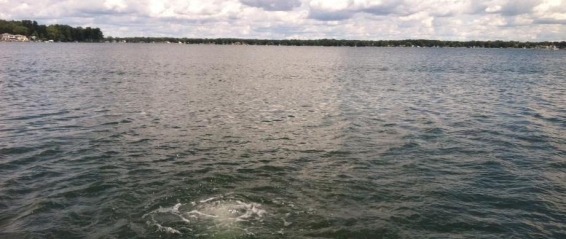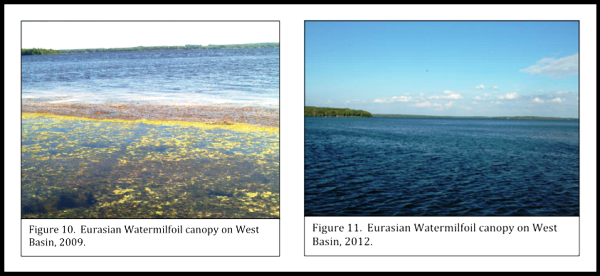36% Milfoil Reduction In 3 Months!
Paradise Lake, Carp Lake Michigan – 400 Acre West Bay
Paradise Lake demonstrates speed and effectiveness of Lake Savers Whole-Lake Technology™ on reducing Eurasian Watermilfoil. It’s also a testament to a lake community choosing not to use chemical herbicides!
PROBLEM
- Excessive invasive Eurasian Milfoil growth preventing boat navigation…
- Severe accumulation of dead organic sediment deposit (muck) feeding excessive Milfoil
- Severe oxygen depletion on lake-bottom and in water column
SOLUTION
- Installation of Laminar Flow Inversion restored dissolved oxygen levels to lake-bottom, reduced sediment bound phosphorous and nitrogen fueling excessive weed growth, and redirected them to beneficial native aquatic plants
- Addition of non-pathogenic bacterial enzymes to Biologically Accelerate breakdown of microbial organic sediment matter (muck)
- Measurement of efficacy by independent third-party Limnology Firm (Restorative Lake Sciences)
RESULTS
- Dense Milfoil Canopy Reduced from 61 Sites to 39 Sites in 3 Months
- 400 Acre West Basin Treatment area boatable for the first time in several years!
- 100% Herbicide Free Solution
Pictures are worth a thousand words –
Paradise Lake West Basin Success Story
Like many inland lakes, the West Basin of Paradise Lake had a severe infestation of Eurasian Milfoil with a dense canopy covering several hundred acres of the lake. More than an eyesore, the Milfoil was so thick it inhibited boat navigation, fishing and swimming.
The reason for the excessive weed growth was years of nutrient overloading – both from the watershed and from the accumulated organic matter coating the bottom of the lake. Excess phosphorous and nitrates were fueling the weed growth, dissolved oxygen was not being sufficiently circulated from surface to bottom, and beneficial ‘muck eating’ aerobic bacteria that depends on dissolved oxygen to break-down organic sediment on the lake-bottom was insufficient.
Lake Savers Whole-Lake Technology was installed in June 2012. Analysis of progress was conducted by Restorative Lake Sciences after 3 months of operation in October 2012. In 220 sampling locations the analysis determined that Milfoil had been reduced from 61 sites to 39 with an overall reduction of 10% and a projected yearly decrease of 20%.
2012 was the first Summer in many years that there was not milfoil breaking the surface anywhere in the 400 acre West Basin treatment area.
To Download Paradise Lake 2012 Study click [here]

























